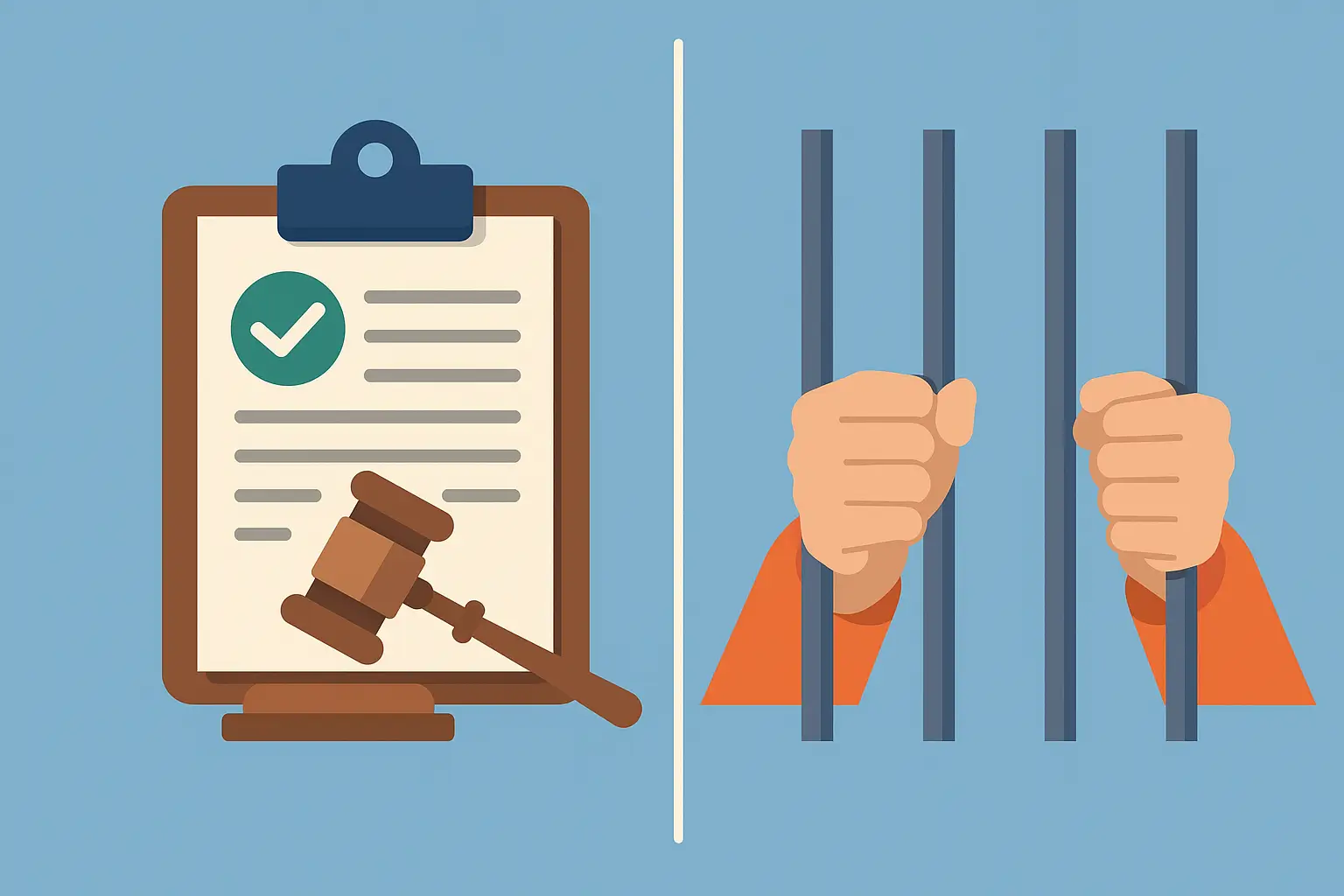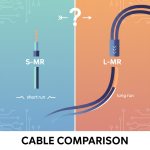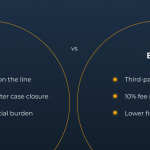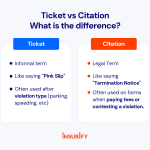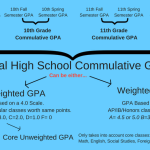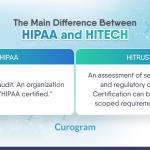Have you ever wondered what the difference is between probation and parole? These terms often pop up when discussing the criminal justice system, but they’re not interchangeable.
Understanding the distinction can help you grasp how the legal system works and what it means for those involved. Whether you’re curious about how these processes affect individuals or you’re trying to make sense of legal news, knowing the difference is crucial.
This article will unravel the complexities of probation and parole, providing clear insights to satisfy your curiosity and enhance your knowledge. Ready to dive in and discover what sets these two legal terms apart? Keep reading, and you’ll find the answers you’re looking for.
Defining Probation
Probation is a court-ordered period of supervision. It allows individuals to stay in the community. They avoid jail time by following strict rules. Probation aims to rehabilitate offenders. It encourages positive behavior changes.
Understanding Probation’s Purpose
Probation serves as an alternative to incarceration. It offers offenders a chance to reform. They must comply with specific conditions. These conditions are set by the court. The goal is to prevent repeat offenses.
Key Components Of Probation
Probation includes regular meetings with a probation officer. It may involve counseling or community service. Offenders must follow legal guidelines. Violating these can lead to serious consequences. This ensures accountability and public safety.
Probation Vs. Jail Time
Probation allows offenders to remain in society. Jail time removes them from daily life. Probation focuses on rehabilitation. Jail emphasizes punishment and deterrence. Both aim to reduce crime rates.
Benefits Of Probation
Probation reduces prison overcrowding. It saves taxpayer money. Offenders can maintain family relationships. They can work and contribute to society. This supports their long-term development.
Challenges Of Probation
Probation requires strict adherence to rules. Some find it difficult to adjust. Monitoring can be demanding. Noncompliance leads to serious penalties. Success depends on commitment and support.
Defining Parole
Understanding the concept of parole is crucial in grasping the differences between probation and parole. Parole involves the conditional release of a prisoner before their full sentence is served. This release is based on good behavior and rehabilitation potential. It allows individuals to reintegrate into society under supervision. Parole aims to support the transition from incarceration to community life.
What Is Parole?
Parole is a supervised release from prison. It occurs before the end of a sentence. Parolees must follow certain rules during their release. These rules ensure they are ready for society. Parole officers help with this transition.
How Parole Is Granted
Parole is granted by a parole board. The board reviews the prisoner’s behaviour. They assess rehabilitation efforts and community impact. The board makes a decision based on these factors. Not everyone qualifies for parole.
Conditions Of Parole
Parole comes with strict conditions. Parolees must meet regularly with their parole officer. They may need to attend counselling sessions. Employment is often required. Violating these conditions can lead to a return to prison.
Purpose Of Parole
Parole serves multiple purposes. It aims to reduce prison overcrowding. It supports the prisoner’s rehabilitation process. It encourages positive behaviour in prison. Parole also aids community safety. It ensures parolees are monitored closely.
Key Differences
Probation is a court-ordered period of supervision in place of prison time, focusing on rehabilitation. Parole allows early release from prison under strict conditions, aiming to reintegrate individuals into society. Both involve monitoring but differ in timing and purpose.
Understanding the key differences between probation and parole is crucial if you or someone you know is navigating the criminal justice system. Both terms often get used interchangeably, but they have distinct meanings and implications. Knowing these differences can help you make informed decisions and better understand the legal landscape.
Legal Status
Probation is a court-imposed sentence that allows an individual to remain in the community under supervision instead of serving time in prison. It is a form of punishment given directly by the court.
Parole, on the other hand, is a conditional release from prison. A parole board grants parole after an inmate has served a portion of their sentence. This means the individual has already spent time in prison and is now allowed to serve the remainder of their sentence outside, under supervision.
Supervision Requirements
Both probation and parole require supervision, but the specifics can vary. Probationers report to a probation officer and must adhere to certain conditions like regular meetings, drug tests, and maintaining employment. Violating these terms can result in jail time.
Parolees also report to a parole officer and must follow similar conditions. However, the consequences for violating parole are typically more severe, often leading to a return to prison. Have you ever wondered how much freedom you really have under these forms of supervision?
Eligibility Criteria
Eligibility for probation typically depends on the severity of the crime and the offender’s criminal history. Non-violent offenders and first-time offenders are more likely to be granted probation.
Parole eligibility is determined by the parole board and often depends on factors like behavior while incarcerated, the nature of the offense, and the time served. Parole is generally granted to inmates who demonstrate good behavior and show signs of rehabilitation.
Understanding these differences can empower you to navigate the system more effectively. Whether you’re advocating for someone or facing these issues yourself, knowing the legal distinctions can make a world of difference. Always ask questions and seek clarity from legal professionals to ensure you’re on the right path.
Conditions And Violations
Probation lets offenders stay in the community under supervision instead of going to prison. Parole allows early release from prison with conditions. Both have rules to follow, but parole comes after serving part of a sentence. Violating these conditions can lead to serious consequences.
Understanding the conditions and violations associated with probation and parole can be quite enlightening. These terms are often used interchangeably, but they have distinct meanings and implications. Knowing the differences can make all the difference in navigating the legal system effectively.
Probation Conditions
Probation is typically an alternative to serving time in jail. When someone is on probation, they have specific rules to follow. These might include regular check-ins with a probation officer, attending counseling sessions, or even maintaining employment.
Conditions can vary significantly from one person to another. A friend of mine was on probation and had to complete community service hours as part of his requirements. It was a challenge, but it kept him accountable.
Have you ever wondered what happens if these conditions aren’t met?
Parole Conditions
Parole, on the other hand, comes after someone has served part of their prison sentence. The conditions of parole are designed to help reintegrate individuals into society. This might include finding a stable place to live or participating in rehabilitation programs.
Parolees often have stricter conditions compared to those on probation. My uncle, who was on parole, had to report to his parole officer more frequently than my friend on probation. This kept him focused and gave him a sense of purpose.
Do you think these conditions are fair, or do they add unnecessary pressure?
Consequences Of Violations
Violating the conditions of probation or parole can have serious consequences. The repercussions often depend on the severity of the violation. A minor infraction might result in a warning, while serious breaches could lead to incarceration.
Imagine missing a meeting with your probation officer. This could be seen as a violation. My friend missed one due to unforeseen circumstances, and it was a nerve-wracking experience waiting to see what the outcome would be.
Why risk it? Understanding and adhering to these conditions can make life after sentencing more manageable.
Role Of Probation Officers
The role of probation officers is pivotal in the criminal justice system, serving as a bridge between offenders and society. These officers play a crucial part in rehabilitating individuals who have been placed on probation, rather than serving time in prison. If you’ve ever wondered what keeps the wheels turning in the probation system, understanding the duties and interactions of these officers can provide valuable insights.
Duties And Responsibilities
Probation officers have a wide range of responsibilities that ensure offenders are staying on the right track. They prepare detailed reports that help the court determine suitable probation terms. Imagine being tasked with assessing someone’s entire lifestyle to predict their future actions — it’s no small feat.
They also monitor compliance with probation terms, such as attending counseling sessions or completing community service. Failures in these areas can lead to serious consequences, so a probation officer’s vigilance is crucial. Their duty extends beyond paperwork, requiring them to be proactive in preventing recidivism.
Interaction With Offenders
Interaction with offenders is where probation officers truly make a difference. They hold meetings to discuss progress and address any challenges the offender faces. These interactions are not just formal check-ins; they can be life-changing conversations that steer individuals away from crime.
Probation officers often find themselves as mentors, offering guidance and support. Picture a scenario where someone is struggling with addiction—your role as a probation officer could be the turning point in their recovery journey. How would you handle such a delicate situation?
Through regular communication, they build a rapport that encourages trust and honesty. This relationship is vital for successful rehabilitation. Can you imagine being the person who helps someone find hope and purpose again?
Probation officers play a crucial role in helping offenders reintegrate into society. Their work is not just about enforcing rules but also about providing support and guidance. Whether through assessing risks or offering counsel, they are integral to transforming lives.

Role Of Parole Officers
Parole officers play a crucial role in the criminal justice system. They help parolees reintegrate into society. Their work ensures public safety and supports rehabilitation. By guiding parolees, they help reduce re-offense rates. Their involvement is vital in maintaining balance between supervision and support.
Duties And Responsibilities
Parole officers monitor parolees’ compliance with release conditions. They conduct regular check-ins, both scheduled and unscheduled. They help parolees find housing and employment. They also coordinate with community resources for support services. Parole officers maintain detailed records of interactions and progress. They act as a bridge between parolees and the justice system.
Interaction With Parolees
Parole officers establish trust with parolees through regular communication. They provide guidance and support during the transition period. Officers address challenges parolees face in daily life. They offer advice on legal and personal matters. This relationship is key for successful rehabilitation. Parole officers also help parolees set and achieve goals.
Impact On Offenders
Probation lets offenders stay in their community with conditions, while parole involves release from prison under supervision. Both aim to rehabilitate but differ in timing and oversight. These differences impact how offenders reintegrate into society and comply with legal expectations.
Understanding the impact on offenders is crucial when examining the differences between probation and parole. Both systems aim to reintegrate individuals into society, but they offer distinct paths and challenges. Whether you’re a former offender or someone trying to comprehend these legal processes, grasping their effects can provide valuable insights into the criminal justice system.
Rehabilitation Opportunities
Probation typically allows offenders to remain in their communities, opening doors to numerous rehabilitation programs. You might find yourself participating in educational courses, job training, or counseling sessions aimed at reducing recidivism. These programs are designed to help you build a better future, often with the support of a probation officer who monitors progress.
Parole, on the other hand, kicks in after serving part of your sentence in prison. It offers a second chance to transition back into society, but opportunities for rehabilitation can vary. Some parolees benefit from similar programs to those on probation, though resources may be more limited due to budget constraints. Have you ever wondered how these differences affect long-term success?
Challenges Faced
While probation offers the comfort of being at home, it comes with strict rules. You might face curfews, mandatory check-ins, and restrictions on certain activities. Violating these conditions can lead to immediate consequences, including potential jail time. This constant oversight can be stressful, but it’s crucial for those committed to turning their lives around.
Parolees confront the challenge of readjusting to life outside prison walls. Finding employment or housing can be difficult due to past convictions. You may feel overwhelmed by the transition, facing both societal stigma and personal struggles. Yet, every challenge presents an opportunity for growth. How do you think one can balance these obstacles while seeking a fresh start?
Both probation and parole offer unique paths to rehabilitation, each with its own set of hurdles. Embracing the resources available and staying focused on personal goals can make a significant difference in an offender’s journey toward reintegration. What steps would you take to ensure success in such a scenario?

Public Perception
Probation and parole are often misunderstood by the public. Both terms relate to the criminal justice system. Yet, they serve different purposes. This confusion leads to many misconceptions. Understanding these differences is crucial. It impacts how society views individuals in these systems.
Common Misconceptions
Many people believe probation and parole are the same. This belief is incorrect. Probation is a court-ordered period before jail time. Parole is early release from prison with conditions. Confusing them affects how people judge those involved. People think probation means less serious crimes. Parole is often seen as a reward for good behavior. These misconceptions can lead to stigma.
Societal Impacts
Misunderstanding probation and parole impacts society. It influences how communities support individuals. People on probation or parole face judgment. They struggle to reintegrate into society. This can affect employment opportunities and relationships. Understanding the systems can improve community support. It can reduce stigma and promote acceptance. Awareness helps in creating a more inclusive society.
Future Trends
Probation is a court-ordered period allowing offenders to stay in the community under supervision. Parole involves conditional release from prison, granting freedom before the complete sentence is served. Both aim to reintegrate individuals while ensuring public safety.
Understanding the future trends in probation and parole can help you grasp how these systems are evolving to better serve justice and society. As technology advances and societal values shift, supervision and legislative practices are also adapting. Let’s explore some of the key innovations and legislative changes that are shaping the future of probation and parole.
Innovations In Supervision
The way probation and parole are supervised is undergoing significant transformation. Digital tools like electronic monitoring devices and mobile apps are becoming more prevalent. These tools offer real-time tracking and can help reduce the need for frequent in-person check-ins.
Imagine having your progress monitored through a smartphone app that provides reminders for your meetings or court dates. These innovations not only enhance efficiency but also add a layer of accountability. They can help individuals stay on the right path while offering officers better data to support their roles.
Artificial intelligence is also making its mark by assessing risks and needs more accurately. This can lead to more personalized supervision plans. Are these tools a step towards more humane and effective supervision, or do they raise concerns about privacy and autonomy?
Legislative Changes
Shifts in legislation are also influencing probation and parole. Recent laws focus on reducing incarceration rates and promoting rehabilitation. Some states are experimenting with shorter probation periods and more lenient conditions for non-violent offenders.
For instance, jurisdictions are revisiting mandatory minimum sentences, giving judges more discretion. This can lead to fairer outcomes and reduce the burden on the correctional system. Legislative changes like these reflect a growing belief in second chances and the power of rehabilitation.
However, these changes are not without debate. You might wonder if these legislative shifts will truly balance public safety with the need for reform. What role should community and advocacy groups play in shaping these laws?
As you consider these future trends, think about how they might impact individuals and communities. Are we moving towards a more just system, or are there other challenges that need addressing? Your thoughts and actions could be part of the solution.
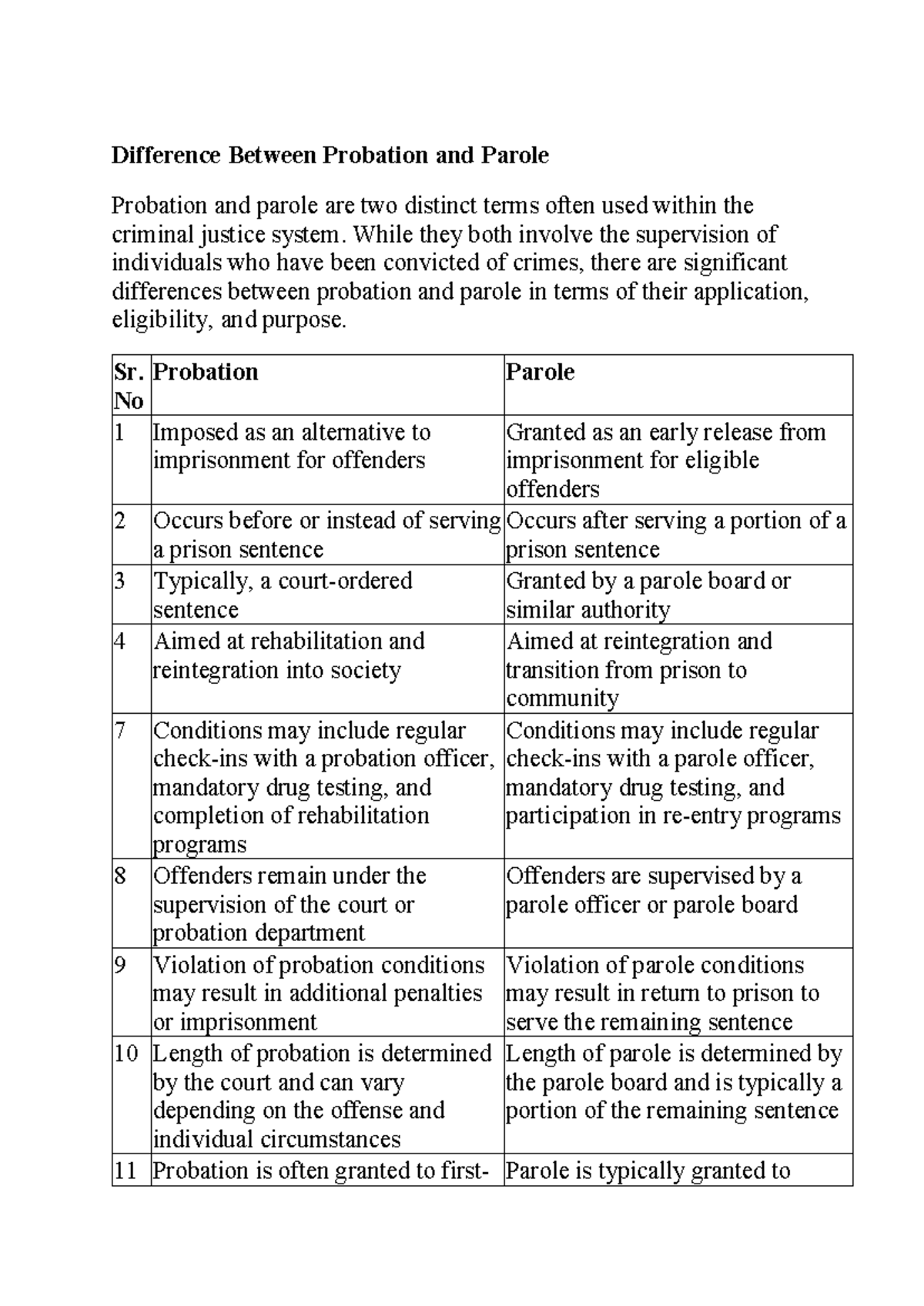
Frequently Asked Questions
What Is Probation In Criminal Justice?
Probation is a court-ordered period of supervision for offenders. It allows them to remain in the community instead of serving jail time. During probation, individuals must adhere to specific conditions set by the court. Violating these conditions can result in incarceration or additional penalties.
How Does Parole Differ From Probation?
Parole is the conditional release of a prisoner before the end of their sentence. Unlike probation, parole involves serving time in prison first. Parolees must comply with set conditions and report to a parole officer. Violations can lead to re-incarceration.
Who Decides If Someone Gets Parole?
A parole board typically decides if a prisoner is eligible for parole. They assess factors like behavior, rehabilitation, and risk to society. The decision is based on whether the individual can safely reintegrate into the community.
Can Probation Be Revoked?
Yes, probation can be revoked if the individual violates its terms. Common violations include failing drug tests or committing new crimes. Revocation results in serving the original jail sentence or additional penalties.
Conclusion
Probation and parole both offer alternatives to jail time. Probation happens instead of prison, while parole follows a prison term. Both aim to support rehabilitation. They involve supervision and certain conditions. Violating these conditions can lead to serious consequences. Understanding these differences is important.
It helps navigate the legal system better. Knowing your rights and responsibilities can make a big difference. Always seek legal advice if unsure. This ensures you stay informed and protected.

I’m someone who’s always been fascinated by how small differences can lead to big understanding. That’s why I love writing “What’s the difference between…” content; it helps me explore topics from multiple angles and explain them in a clear, practical way. Whether it’s tech, productivity, business, or everyday decisions, I enjoy making complex ideas easier to compare, understand, and act on.
